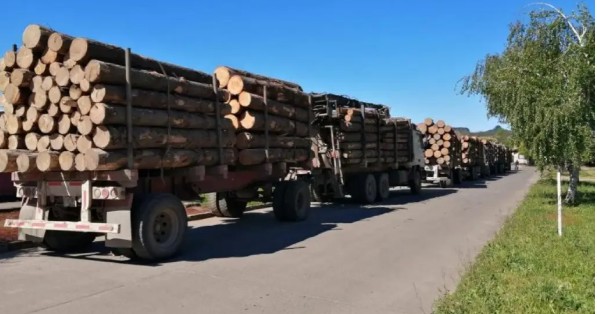The forestry industry is one of the main economic activities in Chile, but it is also one of the most affected by illegal timber theft, not just in the Southern Macrozone. Despite measures and plans to combat this illegal practice, the situation remains concerning. However, significant progress has recently been recorded in the fight against timber theft in the country, thanks to collaboration between forestry service providers, police forces, and oversight authorities, highlighted René Muñoz Klock, manager of the Association of Forestry Contractors. He noted that these advances have resulted in a reduction in timber theft occurrences, as well as the identification and arrest of some buyers in the illegal market.
In an interview with *La Tribuna*, the manager of the Association of Forestry Contractors stated, "We understand that the implementation of the timber theft law has had a significant impact on the crime. In Biobío, there are no known gangs focused on timber theft; they are in Arauco and Malleco, in the La Araucanía region, where we have information that the situation has improved." "We have frequent contact with the Regional Prosecutor's Office of La Araucanía, and in monthly meetings, they explain the progress and efforts being made regarding this crime," shared the industry leader.
FORESTRY ASSOCIATION HAS HELPED IMPROVE OVERSIGHT
The spokesperson added, "We have been training that Prosecutor's Office in technical terms: how to measure a truck, the type of wood it carries, the dimensions of sawn wood, among other details." "This allows for better implementation of the investigative techniques they are carrying out. Initially, only roundwood was being inspected, but we pointed out that sawn wood was also being transported," explained Muñoz Klock. The representative of Acoforag A.G. noted that it was established that "there were facilities producing sawn wood in the forest."
The head of the Association of Forestry Contractors also pointed out that "all this illegal activity is attractive in terms of daily wages for workers, so they can easily migrate to that sector when they see it is well-paid, which is what is happening in reality." "The same goes for forestry drivers. Timber theft pays daily, not monthly, making it appealing. But since it is illegal work, the laborers have no contract, social security, or health benefits, harming their future," listed the association's manager.
THEY BELIEVE PROGRESS HAS BEEN MADE IN CURBING TIMBER THEFT
"These are the concepts that need to be made clear, but we do notice that, overall, the illegal market has decreased, thanks to the law preventing workers from migrating to illegal operations," observed René Muñoz Klock. He also referred to buyers of stolen timber in Chile and mechanisms to deter them from acquiring illegally sourced materials: "The Internal Revenue Service and the information they handle must be cross-referenced with data from CONAF and the Treasury."
"This would help identify companies purchasing stolen products. I believe the private sector is doing its part and developing control programs," ventured the head of the Association of Forestry Contractors A.G. The leader explained that these measures monitor "the origin and destination of the wood, ensuring traceability of the products—significant progress has been made in this regard." "On the other hand, thanks to certain procedures and seizures, some buyers have been identified, particularly in the Biobío province area," valued Muñoz Klock. The coordinator of forestry workers considered that "we are making progress in reducing the 'business' of stolen timber. We know that terrorist activities were financed through this crime."
Source:www.latribuna.cl







Comments (0)
No comments yet. Be the first to comment!
Leave a comment